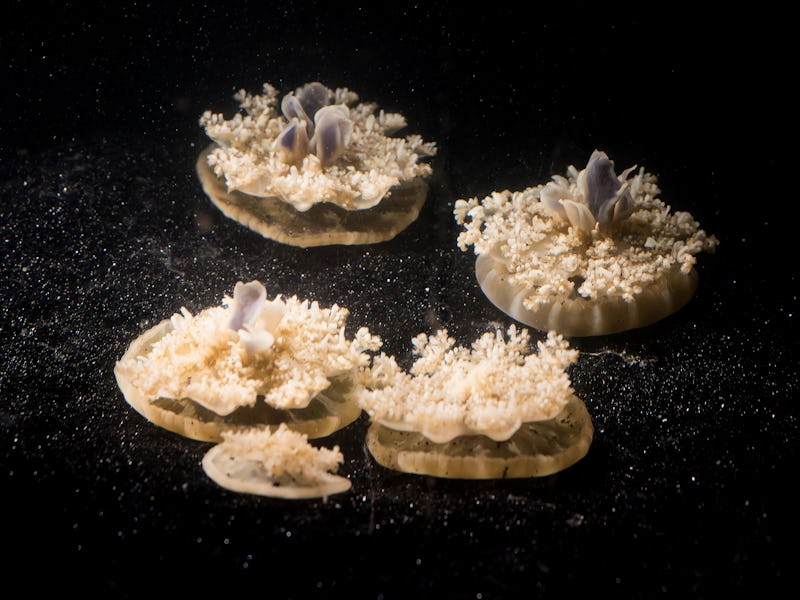'All-Nighter' Jellyfish Study Reveals the Origins of Human Sleep
"The brain isn't a necessary component."

Tim Cook famously cuts his beauty rest short by waking up at 3:45 a.m., but even the overachieving Apple CEOs among us need to sleep eventually. It’s in our genes — and, as Caltech scientists reported this week in Current Biology, it’s in animal genes, too. The act of sleeping, they found, is inherent in animals at even the earliest, most primitive end of our evolutionary tree, where the brainless, spineless, upside-down jellyfish Cassiopea are found.
The three graduate students behind the study, Ravi Nath, Claire Bedbrook, and Michael Abrams, asked Inverse point-blank: “Do you think all animals sleep?” It’s tough to answer; we’re used to seeing lazy cats and snoozing pandas on Planet Earth, but sleep among the lesser organisms among us, like dumb-seeming jellyfish, is not so obvious. But now, Abrams says, his team can confidently say that even the simplest creatures need their rest.
“It’s the first animal without a centralized nervous system to have a characterized sleep state,” he says, explaining that this suggests that sleep, in its ancient form, occurs without a brain.
“The brain isn’t a necessary component.”

For us humans, who feel sleep restores us both mentally and physically, this may seem surprising. We associate sleep, after all, with dreaming and the triggering of rapid eye movement, both of which are functions of the brain.
But sleep has evolved over thousands of generations and throughout different species, Nath says. While it may look different between jellyfish and humans, the new study suggests all fundamental sleep behaviors have the same origin.
Across all species, sleep is defined among biologists by three criteria that all humans are familiar with. The first is rapidly reversible quiescence; that is, a sleeping individual must be inactive and easily woken up (otherwise, they’re in a coma or anesthetized). Second, during sleep, it must be harder to arouse an individual than when they’re awake. And lastly, depriving an individual of sleep must make them want to catch up on sleep later.
“This is something we can all relate to, pulling an all nighter. It’s a fundamental component of the sleep state,” says Bedbrook.
“And both the jellyfish and researchers had low levels of activity the following day and night to compensate for that sleep deprivation,” she laughs.
Cassiopea are known for hanging out upside-down; they found it harder to orient themselves when they were just woken up.
Jellyfish, having no brains, are controlled by a “neural net” made up of neurons — a sort of precursor to the brain. Discovering that they are able to sleep raises the question of why sleep exists in the first place. The leading theory, that sleep is meant to conserve energy, makes the most common sense, says Nath, but other theories have been proposed. One possibility, is that sleep is an intrinsic property of neurons. This leads to all sorts of strange questions: If sleep is inherent in certain cells, does this mean plants sleep, too?
The team didn’t look at sleep-related genes in the jellyfish, but it’s likely that we share at least some of them. “What’s cool about that is that the genes involved in sleep regulation and worms, flies, fish, and humans are all very similar to each other,” says Nath.
Jellyfish need to catch up on sleep after pulling all-nighters, too.
Over evolutionary time, sleep-regulated genes were passed on between individuals and spread through species, and their combined effects form the basis of the behavior we now classify as sleep. Something many of us don’t realize is that behaviors can evolve just like species do, says Nath, and that’s probably how human sleep came to be so much more complex than Cassiopea’s inverted repose.
“It gets built upon later. You can start to add memory and other functions to the sleep state,” says Nath, pointing out that all of the behaviors we take for granted probably started off in similarly basic forms. “It’s likely that other states, like aggression or anxiety, evolved in the same way.”
The mystery of why we sleep may not be any clearer as a result of this study, but it gives us a better understanding of just how many species are a part of that puzzle. What’s obvious is that there’s no point trying to fight the need to catch some Z’s. That urge to sleep, it seems, might not just be in your head but built into your very cells.